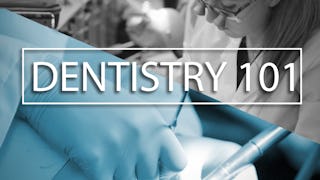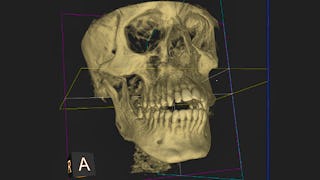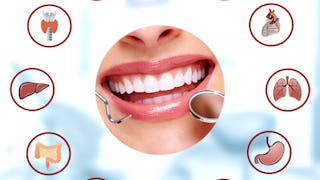This course provides foundational knowledge for those interested in developing a better understanding of basic dental terminology. The course will define and explore clinical and non-clinical terms commonly used in endodontics, oral and maxillofacial surgery, orthodontics, pediatric dentistry, periodontics, prosthodontics, restorative dentistry, dental radiography, and dental practice administration.


Introduction to Dental Terminology

Instructor: Anchal Malik Chopra
3,829 already enrolled
Included with
(14 reviews)
Recommended experience
Skills you'll gain
Details to know

Add to your LinkedIn profile
8 assignments
See how employees at top companies are mastering in-demand skills

There are 8 modules in this course
Welcome to Module 1: Basic Oral Structures and Tooth Terminology. This introductory module offers foundational material that will benefit your learning and set you up for success through the rest of the course. We will begin by exploring basic oral structures, common tooth terminology, and related key terms and functions. Let's get started!
What's included
8 readings1 assignment
This module will review essential terminology surrounding dental x-rays. Dental x-rays, also known as dental radiographs, serve as vital diagnostic tools, revealing concealed dental structures, potential masses, bone density changes, and cavities. With their indispensable role in clinical dentistry, radiographic examinations are routinely conducted on patients. As such, understanding the specifics of these images is fundamental for clinicians in making accurate diagnoses.
What's included
5 readings1 assignment
In this module, we'll explore the terminology associated with restorative dentistry, which involves repairing or replacing teeth to enhance oral health and chewing function. Additionally, we'll delve into terminology related to endodontics, a dental specialty focusing on the treatment of dental pulp and root-related issues.
What's included
12 readings1 assignment
This module will explore the terminology of prosthodontics, a dental specialty focused on creating artificial teeth to replace missing or damaged ones. Prosthodontics involves crafting crowns, bridges, dentures, and other restorative treatments. Moreover, we will gain insights into the techniques and approaches employed to rehabilitate and safeguard facial and oral structures.
What's included
7 readings1 assignment
In this module, we'll explore the terminology of periodontics, a dental specialty centered on the health of the gums, bone, and supporting tissues around teeth. We will review treatment methods and instruments that periodontists use to prevent, diagnose, and treat gum diseases and related conditions.
What's included
5 readings1 assignment
Oral and Maxillofacial Surgery (OMFS) is a dental specialty focusing on conditions in the head, neck, face, and oral region. In this module, we will take a look at the surgical procedures and specialized instruments used by surgeons trained in exodontia and implantology to provide comprehensive care for various oral and maxillofacial issues.
What's included
9 readings1 assignment
Pediatric dentistry focuses on providing dental care for infants, children, adolescents, and individuals with special healthcare needs, emphasizing oral health from infancy through adolescence. In this module, we will learn about the techniques that pediatric dentists, or pedodontists, use to promote oral health and cultivate positive dental habits in children. Additionally, we will review the work of orthodontists who are concerned with diagnosing, supervising, guiding, and correcting malocclusions.
What's included
9 readings1 assignment
In this module, we will explore dental practice administration and gain an understanding of specialized terminology crucial for efficient operations, patient care, and effective communication. Topics covered will include managing patient records, navigating insurance processes, optimizing office workflows, and ensuring regulatory compliance. Becoming fluent in patient records, insurance terminology, and communication protocols will help create an environment that prioritizes efficiency and patient satisfaction.
What's included
5 readings1 assignment
Instructor

Offered by
Explore more from Healthcare Management
 Status: Preview
Status: PreviewUniversity of Michigan
 Status: Free Trial
Status: Free TrialUniversity of Pennsylvania
 Status: Free Trial
Status: Free TrialUniversity of Pennsylvania
 Status: Free Trial
Status: Free TrialUniversity of Pennsylvania
Why people choose Coursera for their career




Learner reviews
14 reviews
- 5 stars
92.85%
- 4 stars
7.14%
- 3 stars
0%
- 2 stars
0%
- 1 star
0%
Showing 3 of 14
Reviewed on Apr 2, 2025
this training was informative and helpful in understanding abuse reporting requirements.

Open new doors with Coursera Plus
Unlimited access to 10,000+ world-class courses, hands-on projects, and job-ready certificate programs - all included in your subscription
Advance your career with an online degree
Earn a degree from world-class universities - 100% online
Join over 3,400 global companies that choose Coursera for Business
Upskill your employees to excel in the digital economy
Frequently asked questions
To access the course materials, assignments and to earn a Certificate, you will need to purchase the Certificate experience when you enroll in a course. You can try a Free Trial instead, or apply for Financial Aid. The course may offer 'Full Course, No Certificate' instead. This option lets you see all course materials, submit required assessments, and get a final grade. This also means that you will not be able to purchase a Certificate experience.
When you purchase a Certificate you get access to all course materials, including graded assignments. Upon completing the course, your electronic Certificate will be added to your Accomplishments page - from there, you can print your Certificate or add it to your LinkedIn profile.
Yes. In select learning programs, you can apply for financial aid or a scholarship if you can’t afford the enrollment fee. If fin aid or scholarship is available for your learning program selection, you’ll find a link to apply on the description page.
More questions
Financial aid available,

